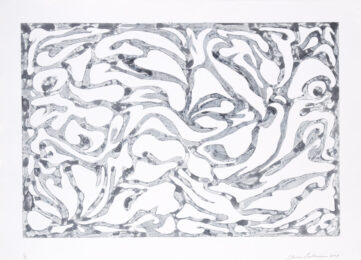

Sam Francis (1923–1994) was an American abstract expressionist painter and printmaker known for his vibrant, bold works. In addition to his paintings, he made significant contributions to printmaking.
Colourful and Vibrant Palette
One of the most distinctive features of Sam Francis’s printmaking is his brilliant and intense use of colour. His prints often feature vibrant hues, and the interplay of colours is a crucial aspect of his visual language.
Abstract Expressionism
Francis was associated with the Abstract Expressionist movement, and this influence is evident in his printmaking. His works often embrace spontaneity and gestural brushstrokes, reflecting the ethos of abstract expressionism.
Lithography
Francis was particularly skilled in lithography, a printmaking technique involving drawing or painting directly onto a flat surface, usually a stone or metal plate. Lithography allows for a wide range of expressive marks, and Francis leveraged this technique to create dynamic and energetic compositions.
Layering and Transparency
Many of Francis’s prints involve layering and transparency. He often used multiple plates or layers of colour to create complex and visually engaging prints. The layering adds depth and richness to his compositions.
White Space
While his works are often filled with vibrant colours, Francis also utilised white space strategically. The interplay between colour and white space contributes to the overall balance and dynamism of his prints.
Organic Forms and Shapes
Francis’s prints often feature organic and flowing forms. He was inspired by nature, and this influence is evident in the biomorphic shapes and fluid lines present in many of his works.
Influence of Japanese Art
Francis spent time in Japan, and his exposure to Japanese art and culture had a significant impact on his work. Elements of Japanese calligraphy, as well as the use of space and balance, can be observed in his printmaking.
Variety in Scale
Francis worked in a range of scales in his printmaking, from smaller, intimate pieces to larger, more expansive compositions. This variety showcases the versatility of his artistic practice.
Exploration of Seriality
Throughout his career, Francis engaged in the creation of series in his printmaking. This allowed him to explore variations on a theme, experiment with different techniques, and delve deeper into certain visual motifs.